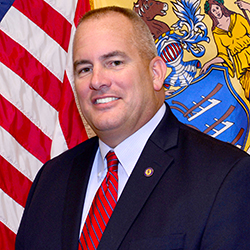NJ State PBA President On Fairness & Equality in Law Enforcement

NJ State PBA President On Fairness & Equality in Law Enforcement
“There is an image of Justice, blindfolded and balancing her scales in Courts across the nation. It sends a message to every citizen that they are guaranteed fairness and equality under the law. New Jersey law enforcement officers swear an oath to ensure that balance is respected when they are asked to enforce the laws of our State.
Since the murder of George Floyd, there has been a roaring and sometimes counterproductive, debate raging over the need for reforms in law enforcement that will have a long-lasting impact on finding the balance between justice and injustice. Over the last year, New Jersey has acted on many police reforms to include updating the Use of Force policy, updating bias training, the release of major disciplinary actions will be made public and bills have passed to promote minority recruitment into law enforcement and creating an Attorney General shooting response team among many other bills. This is on top of the rigorous requirements for our already best in the nation training.
But sometimes finding balance between policing and our communities needs some fine tuning. That was necessary when the law took effect mandating body worn camera (BWC) use by police. That law prohibited an officer from reviewing their camera footage when writing their reports. That made no practical sense to law enforcement officers, and it was therefore critical that the Legislature fix that error in the law.
Preventing a law enforcement officer from reviewing their BWC creates a problem for the accurate preparation of reports. An officer can arrive at a chaotic scene where there are multiple participants or perhaps their report cannot be written until hours after an incident concludes. The review of a BWC is therefore necessary to ensure nothing critical is left out of the report. An officer’s memory is no different from anyone else. But an officer who must testify to what they saw, what was said to them, what was taking place around them and why they acted as they did under oath in court must be allowed to use the technology provided to them.
The bill permitting officers to review their camera footage when writing reports passed the Legislature overwhelmingly with bi-partisan support. The media has attempted to create division between the police and the public regarding this bill. But when a bill passes by a combined vote of 102 to 5, how could anyone consider its passage to be a controversial decision? Opposition from the ACLU and public defenders do not quite represent the people of New Jersey who would find it ludicrous that we require officers to use body cameras and then prevent the officer from using the camera to write basic police reports.
The same balance is required when considering legislation to establish civilian review boards. Civilian Review Boards are already permitted to review police internal affairs records under very reasonable rules established by the Attorney General. But allowing private citizens to possess the power to subpoena records and testimony, overly broad powers beyond what an officer possesses, is a step too far. The bill under review would permit a Board to conduct its own investigation during an internal affairs investigation and give counties the power to swoop in and dictate police review in a local government.
Subpoena power under the proposed bill has little boundaries and it has the very real risk of permitting conflicting statements to a Board and law enforcement investigators, the contamination of evidence and creating an unnecessary political struggle over law enforcement discipline. There is little to be gained through subpoena powers for a Review Board except if the goal is to publicly attack officers.
But while these topics have dominated headlines, there has been shockingly little reporting on the passage of a State PBA initiated bill to finally ban the use of ticket quotas to measure the performance of police officers. This bipartisan bill overwhelmingly passed and was sent to the Governor this week. This bill is true social justice and police reform. We have sought to remove irresponsible quotas for years and this bill should be welcomed by both police and the public alike.
For the many reasonable people who wish to see fair and equal justice in policing evolve, there are the few who simply wish there were no police power at all. But editorial boards and anti-police special interest groups do not speak for the average citizen who supports their police and who simply wish to be treated fairly by a well-trained and respectful law enforcement officer. That is exactly what we all strive to be, and where the discussion on police reform should always begin.”
(Visited 29 times, 1 visits today)









